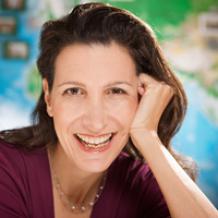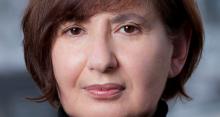Picture Imperfect
Big Ideas
Leading thinkers and activists share game-changing ideas about motherhood and improving maternal health and women's rights.

Tina Sharkey is the former CEO of BabyCenter, an online resource that reaches more than 27 million mothers in 22 countries and provides mom with trusted advice and community support. Tina spoke with IMOW Executive Director Clare Winterton about the ways motherhood and the idea of the maternal role is shifting globally, and what this means for women and families.
Clare Winterton: The Mama in Many Ways gallery looks at the many forms of motherhood that women are embracing. Do you think the ways in which women are becoming mothers and exhibiting motherhood are changing as we get further into the 21st century?
Tina Sharkey: In a prior society, women felt they had to live up to the perfect, framed picture on the wall that everyone held up as the ideal. You have the perfect wedding, then comes the perfect child, and then the perfect life was to ensue. I think this picture of what we thought perfection looked like was shattered a long time ago and we are definitely seeing new definitions of “perfection” arise.
Clare: What do you think shattered that “picture-perfect” family ideal?
Tina: Reality. I think that the more reality was socialized and celebrated in the mainstream, the more people felt empowered to embrace their real lives and live the reality that actually works for them. All the real and “non-traditional” aka “not perfect” things that existed behind that picture-perfect ideal are now very much in the foreground. I believe that the rise of social media, the proliferation of reality television, the rise of exposing what was never perfect, has led to a new kind of acceptance of people’s individual choices and modern lifestyles.
This social media “exposure” is also part of celebrity culture: Madonna, Brad and Angelina, Sandra Bullock and other high profile celebs who are raising “non traditional” families are in the constant public eye. Children adopted from different countries mixed in with biological children. It is all in the mix. The timing and definition of when and why to start and end a marriage is also changing and gaining rapid acceptance in the mainstream. The fact that US and People magazines, each dedicate on average six to twelve pages to these new modern families is a clear sign that our society is mesmerized by the changing norms and celebs have become a proxy for what is now acceptable in the mainstream.
Clare: So how do you think this has affected the way people view their own family structure or their own roles as mothers?
Tina: People are more empowered to pursue the life they want to pursue. In terms of individual choices and personal timelines, that may mean continuing their education and professional career. Others are realizing that they are not going to find the perfect mate or perhaps they don’t want to find the perfect mate. There is no stigma to being a single parent today. This realization that life isn’t perfect or that that you are free to pursue your own definition of perfect, is the drive behind this shift.
From a family building perspective, there is a whole new trend of doing whatever it takes to pursue the maternal or paternal dream with the foundational understanding that everything is an individuals’ choice. I think that our society is now about expressing your individual desires and pursuits without judgment. With any luck, we are moving towards a non-judgmental society and people are more equipped to traverse what initially seemed to be an impasse.
Clare: Do you think that this kind of proliferation of different ways of being a mom and creating families is going to continue to change? Looking forward, what do you see happening?
Tina: It is my hope for the future that we’ll have fewer global births, and decrease the rates of maternal and infant mortality globally, In addition, global social media provides so much exposure and connectedness. Exposure can lead to more knowledge, not only of our immediate world, but of the global communities we all are members of. Perhaps, with any luck, this could help to build an empathy network around the world. One that nurtures not only our own primary families but members of the global communities. I see seeds of this around us, but it is only the beginning of what I believe is possible now and in the future.
Clare: We’ve been talking about motherhood shifting and evolving. Is this shift about dads as well?
Tina: It has to be, because we have to welcome them into the more traditional roles that often fall under the motherhood label. In today’s society everyone needs to learn to juggle juggle and multitask and the way we work and live. I do believe, though, that we’ve made tremendous progress in the world as many women are staying in the workplace and the men are staying in the home. I see that all the time and I think it’s fantastic. Really, this particular parenthood shift is about getting to 50-50, where we can share these roles. It has to be OK for a man to be the playground at 10 a.m. pushing the swing, and it has to be OK for the mom to not be at the parent teacher conference. We need to pave the way for men to embrace their maternal calling so that we can be a society that pursues the highest efficiency without judging one another. I think it’s wonderful when men embrace this idea. Both men and women have to reform their perceptions to make this work.
Clare: How do you think your own life and path as a mom is impacted by these kinds of changing definitions of motherhood?
Tina: For me, for my marriage, for my family, we always need to evaluate who can take the lead and who can provide support in any given situation be at it home or at work. That wheel is always spinning and shifting as life tends to move in cycles. Open communication, true partnership and quiet observations of what is best for our family is required at each and every milestone. It isn’t always easy, but with a commitment o a healthy and balanced family and life you can get there., I often am less influenced by society and more so by my own capacity to think for myself and make choices that feel right for me at the time and for my family long term.
Clare: How do you think the world at large would change if we were more cognizant and accepting of multiple kinds of maternal influences?
Tina: The maternal instinct does not need to stay at home or reside exclusively with women. There is so much power and wisdom that resides in all of us and a universal need for us to heal this planet, our planet. Instead of leaving this maternal instinct in the domestic space we need to bring it out and apply it in businesses, in culture, in society, in our communities. No one will evaluate these nurturing skills directly on a job interview, but if we individually and instinctively use those skills beyond their discrete application to our children, we can differentiate ourselves to be more empathic leaders with emotional intelligence and really move mountains.
Related Content
|
Futurist Marina Gorbis explains how motherhood is influenced by social factors, and what the future of motherhood may look like. |
Jennifer Siebel Newsom, filmmaker and founder of MissRepresentation.org, talks about why working mothers need support from all angles in order for the gender revolution to truly progress. |
This photo series looks at a unique option offered by Washington State, USA to imprisoned mothers and their children. |
This documentary short from Rachael Ouko interviews teen moms living in the Mathare Slums of Nairobi, Kenya, where teen motherhood is common.
|





